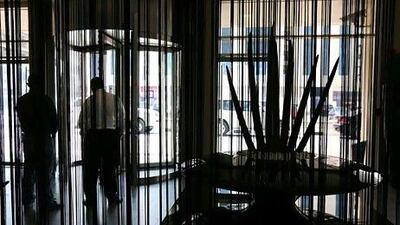Imagine a holiday in Dubai and the glitz and glamour of the extravagant "seven-star" Burj Al Arab hotel and malls brimming with designer names immediately spring to mind. But the emirate today is attracting more and more budget travellers.
Dubai is aiming to increase the numbers of tourists visiting the emirate, targeting emerging markets including India and South America. At the same time, budget airlines are on the rise in the region, with flydubai regularly launching new routes. Now, Dubai needs to develop the hotels to accommodate these visitors.
"Dubai was all about being a luxury destination, but the economic crisis has changed all that, and if you have aggressive tourism targets then you have to have a varied hotel market to suit all budgets," says Gavin Samson, the managing director of Christie + Co Mena, a hospitality advisory company.
Last year, Dubai attracted 9.3 million hotel guests, up 10 per cent on the previous year, according to data from the Dubai Department of Tourism and Commerce Marketing. Hotel revenues reached close to Dh16 billion (US$58.77bn). Budget hotels have already helped boost these numbers.
"Dubai has become a more affordable destination anyway, so the rates, be it five-star, four or three-star, have reduced," said Mr Samson.
"They seem to be really recognising that it has to be a mass tourism approach if they are going to hit the numbers. No longer do you want budget hotels only associated with being close to airports," he added.
"You do want them in city centres. Obviously you don't want them on the beach. You want them in secondary strategic locations. You can't have them necessarily in strategic locations because land is scarce and land costs are very high, which means that they don't stack up financially," says Mr Samson.
"Definitely more of these affordable hotels have to spring up in key areas of Dubai if the numbers make sense - because that type of tourist is coming." Many of these budget visitors are having to head to downmarket, independently run, and often inferior hotels, in Bur Dubai and Deira, he adds.
An increasing number of "branded" good-quality three-star budget hotels have emerged in Dubai in recent years, including Ibis, Centro by Rotana, Premier Inn, Holiday Inn Express, and a home-grown chain, Citymax, which is owned by Landmark Group. But more are needed.
The UAE is still significantly ahead of the rest of the region, however, when it comes to budget hotel development, with 2,808 branded rooms under development compared with 420 in Qatar and 248 in Oman, according to research by Christie + Co.
"Now The UAE is sitting up and saying, 'This is a market we also need to pay attention to,'" says Russel Sharpe, the chief operating officer of Citymax, which charges an average of Dh200 a night at its hotels.
"We've been looking at the top-end the five-star plus, but we actually haven't had a chance to look at the mid-market or even the economy hotels."
He says Dubai needs to develop the right properties, not only to cater for tourists, but to accommodate the growing number of business travellers coming into the emirate who are also looking for a good deal.
"When you say three-star brand, the first image that comes into your mind is these little hotels that are based in Bur Dubai," says Mr Sharpe.
But due to the increased presence of budget airlines such as flydubai and Air Arabia, Mr Sharpe believes that market is expanding.
"We don't necessarily want backpackers, but you do want to be able to give a good package to people who want to visit Dubai, but can't afford the five-star hotels."
Alongside the budget traveller, the emirate is also trying to attract middle-income visitors from its traditional tourist markets.
Somewhat ironically, after years of striving to build its image as a luxury destination, Dubai has launched a £1 million (Dh5.93) advertising campaign in Britain that is partly designed to convince visitors that the city does have affordable options and is not simply all about five-star tourism.
"Branded three-star or budget hotels have entered the market ... however, these hotels have not promoted themselves as aggressively as the glamorous five-star properties, says Gaurav Sinha, the managing director of Insignia, a brand communications firm.
"It is important to consistently promote Dubai's inventory of affordable accommodation to potential budget travellers in overseas markets as it broadens relevance and ensures the destination is catering for all pocket sizes."
Accor, which owns the Ibis brand, agrees there is room to expand in Dubai.
"There is a room for more economy hotels to be developed due to the market segmentation - from economy to luxury market demand - in Dubai which is increasing," says Christophe Landais, the managing director of Accor Middle East. "Therefore the proportion of existing economy and mid-scale hotels do not reflect at the present time that demand."
Still, the standard branded budget hotel in Dubai is a cut above what tourists tend to find elsewhere.
"Budget brands, as people understand them, have definitely been over-engineered for the market," says Mr Samson. "Because the ones we are seeing, actually when you go into them, they look pretty swish.
"When you go into an Ibis, a Centro, a Citymax, a Holiday Inn Express, it doesn't really feel like a budget hotel. How ready is the consumer in this region for true budget? Small rooms, beds, no flat-screen TVs, very basic bathrooms, a couple of staff on hand?"
With the GCC market in mind, Citymax has introduced room service and luggage porterage for its guests, services not often found in many significantly more expensive hotels in Europe.
"The Saudi guest doesn't expect that he's going to carry 17 suitcases," says Mr Sharpe.

